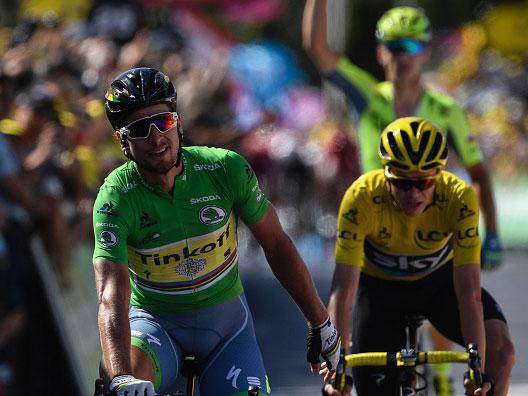Tour de France: Masterful Chris Froome uses element of surprise to increase his overall lead
Briton surprises rivals with late attack to extend his overall lead as Peter Sagan takes stage 11

Your support helps us to tell the story
From reproductive rights to climate change to Big Tech, The Independent is on the ground when the story is developing. Whether it's investigating the financials of Elon Musk's pro-Trump PAC or producing our latest documentary, 'The A Word', which shines a light on the American women fighting for reproductive rights, we know how important it is to parse out the facts from the messaging.
At such a critical moment in US history, we need reporters on the ground. Your donation allows us to keep sending journalists to speak to both sides of the story.
The Independent is trusted by Americans across the entire political spectrum. And unlike many other quality news outlets, we choose not to lock Americans out of our reporting and analysis with paywalls. We believe quality journalism should be available to everyone, paid for by those who can afford it.
Your support makes all the difference.A last-minute attack like Chris Froome on the flat finale in Wednesday's stage of the Tour will not win the Briton his third yellow jersey in Paris. But in terms of psychologically intimidating his rivals before the Tour’s toughest mountain stages, its effect could well be considerable.
Until now, Froome and Sky’s formula for winning the Tours in 2013 and 2015 has been predictable - and very effective. His strategy has been attack on the first big mountain climb, gain a stack of time on the rivals and then hang onto that advantage through the remaining big Pyrenean and Alpine stages as best he can.
Up to now it has worked brilliantly. But this year the Tour’s hardest mountain stages are all in the third week. The Olympic Games - where Froome also wants to shine - come immediately afterwards and one of his most daunting rivals, Nairo Quintana, plans to be at his strongest in the third week, too.
Froome’s aim is therefore to hit top form in the last part of the Tour. And in the first two weeks of the Tour and on stages like Wednesday's flat run into Montpellier, Froome is looking to gain tactical battles, not a war. His late attack may only have gained six seconds advantage on the bunch - plus a six-second time bonus behind winner Peter Sagan. But it was the kind of lightning blow that will rattle even the most formidable of opponents and mentally wear them down.
What makes matters worse for his rivals is that Froome has already successfully sprung one such surprise attack in this year’s Tour, on the downhill towards Bagneres-de-Luchon, which netted him the yellow jersey. With their nerves already on edge, when Froome bolted after Sagan yesterday, it must have been even more demoralising.
Historically for a multiple Tour winner to attack on a pancake-flat stage has only the most distant of precedents - in 1991, when Greg LeMond, a three-time champion, attacked in the first stage in Lyon, to take nearly two minutes on arch-rival Miguel Indurain.
Stage winner and current world champion Sagan - who was barely a year old when LeMond did that attack - could therefore barely believe his eyes when he saw he had Froome for company in a late break, and all this in a finale supposedly designed for sprinters.
“Crazy stage, crazy stage,” the Slovak said repeatedly, “unbelievable. Nice for me, because I win but also not boring. A crazy day.”
“This is bike racing at its best, taking the race on on flat stages like this,” Froome argued. “I’m not being forced into this because of pressure or nervousness, I just went to see what could happen.”
But behind the spontaneity of the attack itself is also a plan, Sky team manager Sir Dave Brailsford argued - for Froome and the team generally to race more unpredictably - to keep their rivals on their toes, gain time and, last but not least, to make their racing more enjoyable. Froome said of his downhill attack on Saturday, for example, that he “felt like a kid again.”
“We’ve thought this through over the winter, we wanted to play the surprise factor more, to be a bit more aggressive. If you don’t try, you don’t win,” Brailsford explained.
How this will affect Froome’s performance on Thursday's stage finish on the Mont Ventoux, widely held to be France’s toughest single climb, is the big question-mark over Sky’s radical change in tactics. The Ventoux has been curtailed from its usual 16 kilometres to 10 because of strong gale-force winds in the area, which would render the ascent to the summit too risky. But Froome warned that “if the weather is that rough beforehand, then it could split apart. It’ll still be a very intense race.”
After Wednesday's surprise performance, how Froome will tackle the Ventoux, though, is anyone’s guess - and that is probably intentional.
Join our commenting forum
Join thought-provoking conversations, follow other Independent readers and see their replies
Comments